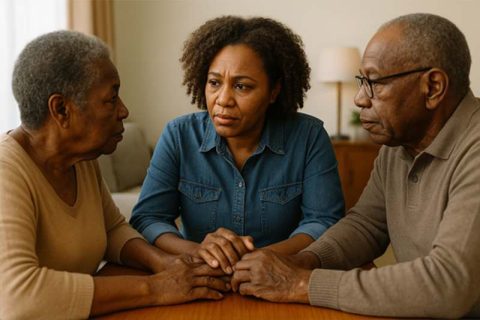July 9, 2025 by

Caring for your parents as they age doesn’t come with a guidebook. Most of us step into it gradually, helping with errands or checking in more often. Then come the big decisions: Is it safe for them to drive? Do they need help at home? Are we ready to talk about long-term care?
And more often than not, we aren’t.
The Shift That No One Prepares You For
It’s one of the most disorienting transitions in adulthood: when your parents, once the ones who held you steady, begin needing support themselves. The shift can be subtle at first. Missed appointments. Stacks of unopened mail. A mysterious dent on the car that no one quite explains.
Eventually, the need for help becomes undeniable. And that’s when many adult children find themselves overwhelmed, unsure, and suddenly responsible.
While fitting this new undertaking into your already packed schedule may seem like the biggest challenge, there are so many deeper layers involved. It’s about holding space for your parents’ changing abilities and emotions while also navigating your own. Grief, frustration, love, and guilt all live together in the same room.
The Conversations We Put Off
One of the hardest parts of caregiving is often what happens before it even begins: avoiding the conversations that feel too heavy.
What do your parents want if their health changes? Have they named a power of attorney? Can they afford in-home care? What about downsizing or getting help with meals?
These questions feel uncomfortable until they become urgent. But talking early, and often, can make future decisions less painful for everyone. It also gives your parents the chance to speak for themselves, before someone else has to speak for them.
Family Dynamics Don’t Disappear
Caring for aging parents doesn’t happen in a vacuum. Old family patterns often resurface. Siblings may disagree about what “the right thing” looks like. One person might take on the bulk of the responsibility, while others stay distant.
If this sounds familiar, you’re not alone. It’s incredibly common. What helps is clear communication, shared expectations, and the reminder that every family handles this phase differently. There’s no perfect blueprint—but there are ways to make it less isolating.
Caring Without Losing Yourself
It’s easy to pour everything you have into supporting a parent, especially if you have a close relationship. But there’s a fine line between helping and disappearing into the role entirely.
That’s why even small moments of self-care matter. Taking breaks. Eating well. Saying yes when someone offers to help. These aren’t indulgences; they’re lifelines. You can’t pour from an empty cup, and caregiving is a long road.
If you feel burned out, resentful, or simply exhausted, it’s a signal that something needs to shift. Professional caregiving support, even just a few hours a week, can offer space to breathe and reconnect with your own life.
We’re Here to Help
Whether you’ve just begun helping your parents more often, or you’re deep into the day-to-day demands of caregiving, know this: what you’re doing matters. And we’re here to support you every step of the way.
At Home Independent Living helps families in Syracuse, Camillus, Clay, and throughout Central New York with compassionate in-home care that eases the stress and supports independence…both yours and your parents’.
Call us at (315) 579-HOME (4663) to find answers to your questions and to learn more about how we can help.
